OU Libraries Timeline: technology
1963: First photocopier
The first photocopier was installed at Kresge Library. Copies cost 10 cents a page, but the price was predicted to decrease.1964: Library broadcasting system
Kresge Library introduced a Library Broadcasting System, playing a variety of material including "Bach, Baez, and the Gemini Space Shot", which students could listen to using portable transistor headsets.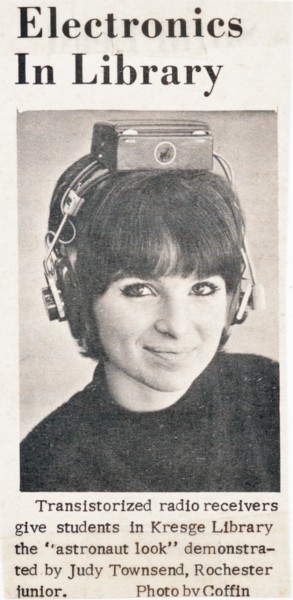
1965: IMB 357 computer
An IBM 357 data collection system (a punch-card based computer capable of sending and receiving material remotely) was installed in the technical processes department to facilitate the ordering and cataloguing of library materials.1966: Computerized circulation system
A computerized circulation system was implemented, the first of its kind in Michigan.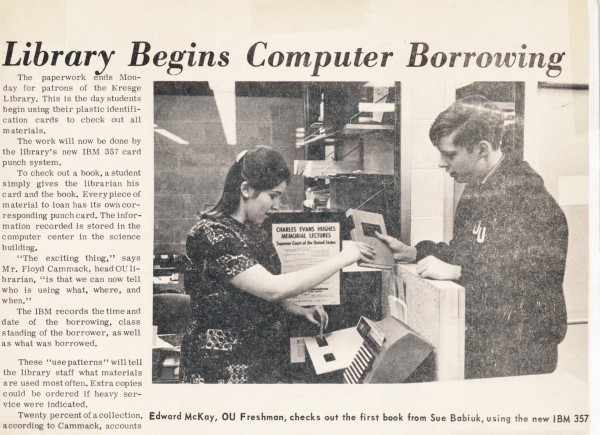
1972: Telephone hotline
A telephone information hotline service was established, for county-wide use. It provided "immediate reference, referral and photo-copy service when the resources of the local public libraries are unable to meet the needs of their patrons."1977: Bibliographic Retrieval System
The library began to offer computer-assisted literature searching using the Bibliographic Retrieval System. The databases which were available on BRS at that time provided bibliographic citations to the literature of medicine, agriculture, chemistry, physics, education, management and administration, electrical technology, electronics, computers and control engineering, environment and psychology. Three librarians were initially trained to perform searches in these databases for students and faculty, a complex process which could take several hours, and cost an average of $25 per search. In the first year, 41 such searches were performed.1978: Calculators
The library purchased two hand-held calculators that students could borrow. The annual report stated that "students have had occasion to borrow these calculators frequently and that the calculators have withstood moderately heavy use."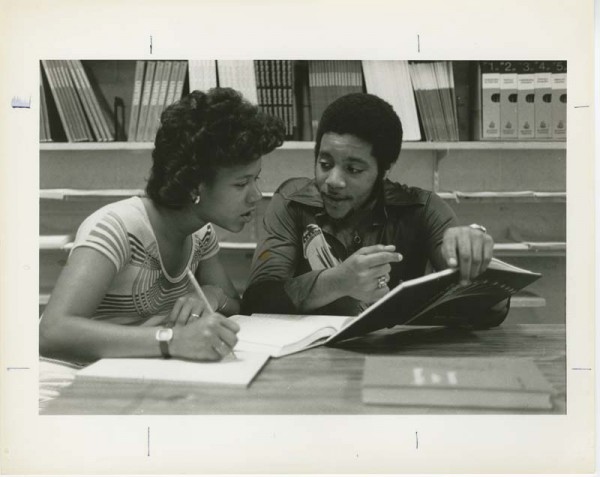
1979: End of the door guards
The library's 'door guards' were replaced by an electronic scanner.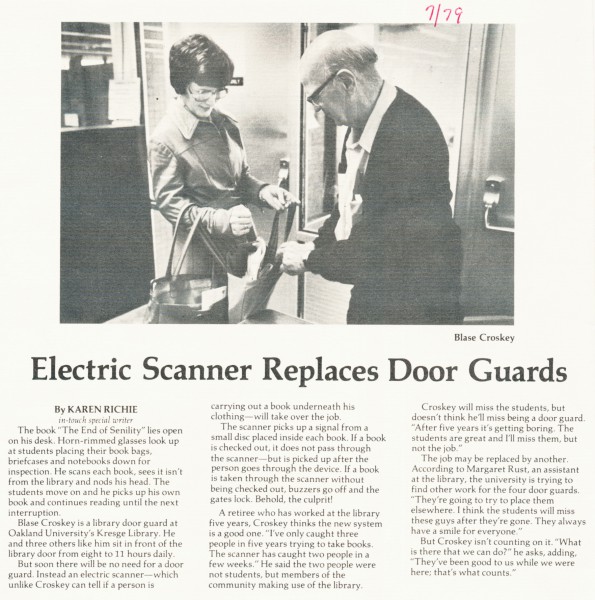
1983: OCLC terminal
The library's first OCLC computer terminal for public use was installed.1984: 25th Anniversary celebrations
October 22-23, 1984: As part of the university's 25th anniversary celebration, a special exhibit of OU faculty research was organized by the library, and included demonstrations by library faculty of new computer search services.1986: Barcoding books
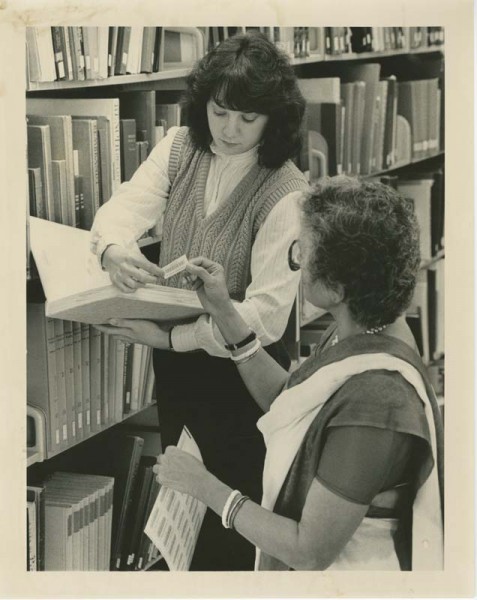 The library began barcoding all of its books. The process was mostly complete by February of 1987.
The library began barcoding all of its books. The process was mostly complete by February of 1987.
1987: Card catalog ends
The Kresge Library discontinued its card catalog.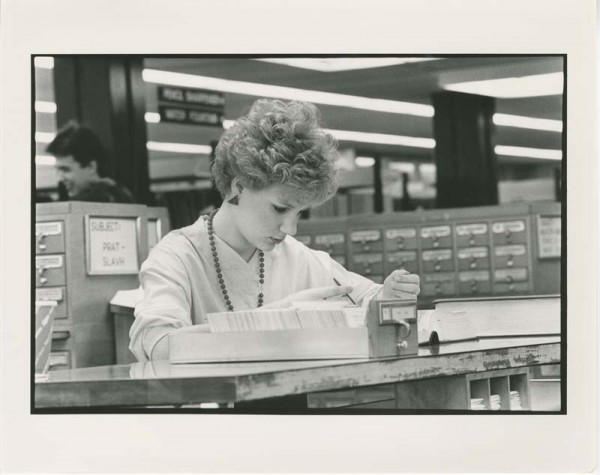
1987: First online catalog
The online catalog LUIS (Library User Information System) was introduced to the public. It allowed users to search the catalogs of Oakland University, Wayne State, the Detroit Public Library, and other local institutions.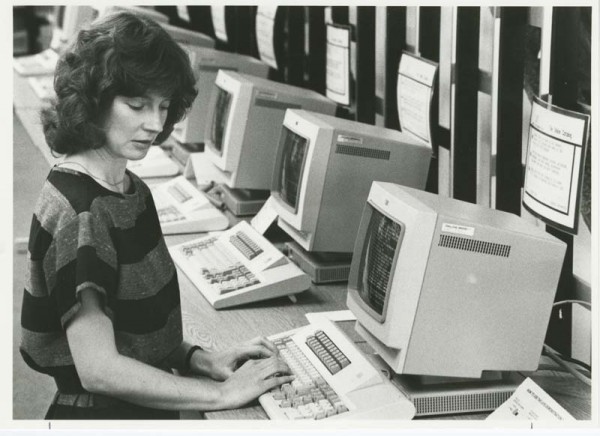
1988: Remote access to online catalog
November 30, 1988: A demonstration of remote access to LUIS (Library User Information System) was held for OU faculty, showing how they could access the library's catalog from their offices or homes.1989: Computers in the library
By this time, every department of the library had at least one personal computer for general office work.1990: Copy cards
Copy card service began to replace coin-operated photocopiers.1992: CALL System
The CALL online ordering system was introduced, allowing patrons to request books and articles to be inter-library loaned from Wayne State University without having to fill out paper forms.1992: Gopher network
The Library Menu became an option on the OU Gopher network (a predecessor to the World Wide Web). Within the Kresge Library main menu were such options as the Acquisitions List of New Books, CD-ROM Tutorials, and information about library services.1994: Email reference service
Kresge Library began providing answers to reference questions via email.1996: Computer labs
The first classes were taught in a new lab with state of the art instructional equipment, including 25 computer workstations, a CD tower and a file server. Total cost was $150,000, half being financed by a grant of the National Science Foundation. The room was named 'Statistics Classroom for Social Sciences and Business" as it was used to teach statistics as well as library research.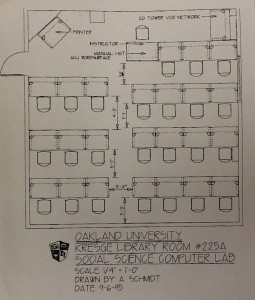
1998: Voyager
The library's new online public access catalog, Voyager, was opened to the public.2003: Email notifications
The Kresge Library switched to notifying patrons of overdue books and fines exclusively by email.2004: Ask A Librarian
Kresge Library instituted its popular 'Ask A Librarian' online reference service. Wireless network access becomes available throughout the library building.Photos courtesy of the Oakland University Archives.